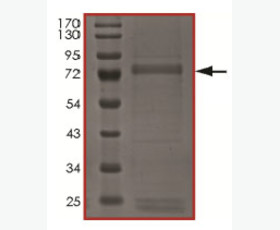Recombinant Human Fibroblast Growth Factor 2/FGF-2/FGFb
| Product name: | Recombinant Human Fibroblast Growth Factor 2/FGF-2/FGFb |
| Source: | E.coli |
| Purity: | Greater than 95% as determined by reducing SDS-PAGE. |
| Buffer Formulation: | Lyophilized from a 0.2 μm filtered solution of 20mM TrisHCl, 150mM NaCl, pH 7.5. |
| Applications: | Applications:SDS-PAGE; WB; ELISA; IP. |
| Storage: | Avoid repeated freeze/thaw cycles. Store at 2-8 oC for one month. Aliquot and store at -80 oC for 12 months. |
| UOM: | 100ug/50ug/200ug/1mg/1g |
| Source | E.coli |
| Description | Recombinant Human Fibroblast growth factor 2 is produced by our E.coli expression system and the target gene encoding Met134-Ser288 is expressed. |
| Names | Fibroblast growth factor 2,FGF-2,Basic fibroblast growth factor,Bfgf,Heparin-binding growth factor 2,HBGF-2,FGF2,FGFB |
| Accession # | P09038 |
| Formulation | Lyophilized from a 0.2 μm filtered solution of 20mM TrisHCl, 150mM NaCl, pH 7.5. |
| Shipping |
The product is shipped at ambient temperature. |
| Reconstitution |
Always centrifuge tubes before opening. Do not mix by vortex or pipetting. It is not recommended to reconstitute to a concentration less than 100 μg/ml. Dissolve the lyophilized protein in ddH2O. Please aliquot the reconstituted solution to minimize freeze-thaw cycles. |
| Storage |
Lyophilized protein should be stored at < -20°C, though stable at room temperature for 3 weeks. Reconstituted protein solution can be stored at 4-7°C for 2-7 days. Aliquots of reconstituted samples are stable at < -20°C for 3 months. |
| Purity |
Greater than 95% as determined by reducing SDS-PAGE. |
| Endotoxin | Less than 0.1 ng/µg (1 IEU/µg) as determined by LAL test. |
| Amino Acid Sequence |
MAAGSITTLPALPEDGGSGAFPPGHFKDPKRLYCKNGGFFLRIHPDGRVDGVREKSDPHIKLQLQ AEERGVVSIKGVCANRYLAMKEDGRLLASKCVTDECFFFERLESNNYNTYRSRKYTSWYVALKRT GQYKLGSKTGPGQKAILFLPMSAKS
|
| Background | Fibroblast growth factor 2(FGF2) is a secreted protein and belongs to the heparin-binding growth factors family. FGF2 is produced by epithelial, tumor and other cell types. It involved in developmental processes and regulates differentiation, proliferation, and migration, FGF2 is a critical factor for growing embryonic stem cells in culture without inducing differentiation. FGF2 has a high affinity for heparan sulfate and binding is a step in the FGF basic activation of FGFR tyrosine kinase. |














